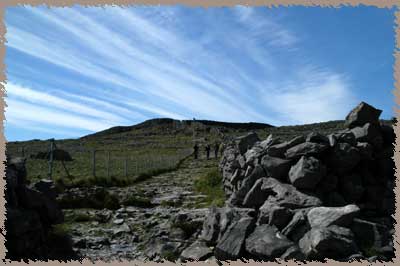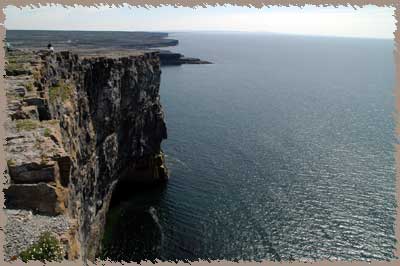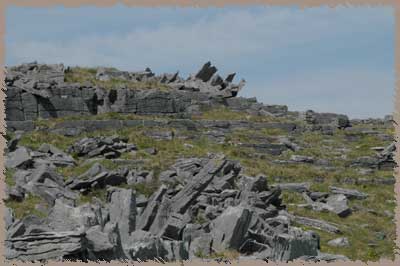
Dun Aengus
Cº Galway
Inishmore, Aram
Neolithic stone fort
OS Grid L 817 098
getting there:
Aer Arann
Aran Island Ferries
approx. €19
from Rossaveal
Photos
neolithic sites
abbeys and churches
castles
dublin
waterford
round towers
lovely scenics
Links
travelogueMegalithic Portal
Detail report
TripAdvisor

Looking up the long path to Dun Aengus
We took the ferry out to the Aran Islands (really only the biggest, Inishmore) and hailed a jaunting car to ride out to the main attraction on the island -- the neolithic stone fort of Dun Aengus.
 The fort is a harrowing climb up stone steps (slick enough in dry weather, I can't imagine them in the rain -- wear good shoes!) and at the top, covers about 11 acres of land enclosed in several rings of stone walls. It is likely that the fort was originally round; however, huge chunks of the cliff regularly fall off into the sea, 300 feet below. Of course, there are really no fences and I was able to sidle up to the dge without any problems and peer over. It's a dizzying drop and I crept backwards holding my breath.
The fort is a harrowing climb up stone steps (slick enough in dry weather, I can't imagine them in the rain -- wear good shoes!) and at the top, covers about 11 acres of land enclosed in several rings of stone walls. It is likely that the fort was originally round; however, huge chunks of the cliff regularly fall off into the sea, 300 feet below. Of course, there are really no fences and I was able to sidle up to the dge without any problems and peer over. It's a dizzying drop and I crept backwards holding my breath.

the 300-foot cliffs -- from the edge!
The concentric circles of stones certainly look like the other ringforts that dot Ireland, but there are some poeple who think that this was not a military (or at least defensive) installation, but instead some sort of religious amphitheatre. With the stone cheveax-de-frise -- a ring of sharp stones angled out from the outer wall in a thiry foot band -- it certaily looks like theplace was designed for defense, at least to me. However, the lack of water available to the fort leads people to believe that it must have been ceremonial in nature, or religious.

the cheavaux-de-frise -- a field of angled stones making it hard to approach
The inner layer of stone is roughly 20' high and 18' thick stone walls, made of grey stone -- the same odd gray stones blocks that rise up out of the Burren, and dot the entire island of Inishmore. Only one entrance breaks the circle, a narrow stone doorway that opens from the steep path below. The innermost rign of dry masonry is nearly 150 feet across. The steps and parapets in the inner walls are not original -- they were added in a restoration attempt in the late 19th century. They may or may not be accurate, although some other stone forts do have these internal stairs.